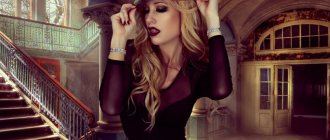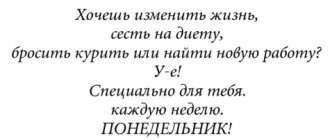Aphorisms and quotes by Rene Descartes
Descartes Rene (1596-1650). French philosopher, mathematician and natural scientist.
Conversing with other centuries is almost like traveling.
Reverence is the inclination of the soul not only to respect the object of veneration, but also the desire to submit to it with a certain trepidation, to gain its favor.
A majority of votes is not irrefutable evidence in favor of truths that are not easily discovered, for the reason that such truths are more likely to be stumbled upon by an individual than by a whole people.
Most books are such that after reading a few lines and looking at a few figures, you already know everything about them; so the rest is put in these books just to fill out the paper.
In most disputes one can notice one mistake: while the truth lies between the two views defended, each of the latter moves further away from it, the more passionately it argues.
Great people believe that there is no greater evil than the cowardice of those who cannot endure adversity with firmness, and although they hate vices, they do not hate those who are subject to these vices, but only have pity for them.
Define words correctly and you will free the world from half the misunderstandings.
Give me matter and motion, and I will create the world.
In order to improve the mind, you need to think more than memorize.
If fate bestows upon someone goods that he is truly unworthy of, and when envy awakens in us only because, loving justice, we are angry that it was not observed in the distribution of these goods, then this envy can be excused.
Envy finds justification if only the malice relates to the distribution of goods, and not to those who possess them or distribute them.
Common sense is the most justly distributed thing in the world: everyone considers himself so endowed with it that even those who are most difficult to satisfy in any other respect do not usually strive to have more common sense than they have.
Of the two human passions - love and hatred - love has the greatest tendency to excess. It is fiery, and therefore stronger and more durable. The more passionately love is inflamed, the more merciless it is towards everything that hinders and threatens it; it gives freedom to hatred to act in more than one direction and thereby frees a whole squad of evils from their shackles.
Intuition is the mind of imagination.
The true greatness of the soul, which gives a person the right to respect himself, lies most of all in his consciousness that there is nothing else that would belong to him by greater right than the control of his own desires.
Whoever undertakes to give instructions must consider himself more skillful than those to whom he gives them: his slightest error deserves censure.
People of strong and generous character do not change their mood according to their prosperity or their misfortunes.
People would not have to be ashamed so easily if they, highly valuing their own personality, considered the possibility of anyone's contempt excluded.
It is not enough to have a good mind, the main thing is to use it well. In the greatest souls lies the possibility of both the greatest vices and the greatest virtues, and the one who walks very slowly can always, following the straight path, advance much further than the one who runs and moves away from this path.
You can maintain your independence everywhere: it is not the place where you live, but the thirst for differences with a lack of character that bends one person over another.
Wisdom is not only prudence in affairs, but also perfect knowledge of everything that a person is able to know.
Watch your body if you want your mind to work properly.
Hope is the soul’s desire to convince itself that what it wants will come true. Fear is an inclination of the soul that convinces it that the desire will not come true.
Arrogance is always a vice, if only because arrogant people have no serious reasons to respect themselves.
Arrogance and generosity consist only in a high opinion of oneself... They differ from each other only in that this opinion of an arrogant person is not based on anything, while that of a generous person is completely fair.
We should not doubt what seems true... however, we should not take it as immutable, so as not to refute the opinions we have formed about something where reasonable evidence requires it of us.
Do not desire anything that you cannot achieve for yourself; your highest asset is freedom, it cannot make you beautiful, rich, respected, strong and happy in the eyes of the whole world, but can only make you free; it makes you not the master of things, but the master of yourself.
They are usually indignant at those who do good or cause evil to persons who do not deserve it; They envy those who in such cases receive some benefit.
It is not enough to have a sound mind - it is important to use it skillfully.
There is no more fruitful activity than knowing yourself.
There is not a single vice that is so harmful to the well-being of people as envy, for those who are infected with it not only upset themselves, but also darken the joy of others.
There is nothing so far that cannot be reached, nothing so hidden that cannot be discovered.
An ordinary mortal sympathizes with those who complain more because he thinks that the grief of those who complain is very great, while the main reason for the compassion of great people is the weakness of those from whom they hear complaints.
Despair is fear without hope.
As the memory becomes burdened with a multitude of facts, the genius and his creative powers weaken and fade.
Order frees thought.
The mind is a burning glass, which, while ignited, itself remains cold.
He is self-willed who has strong desires and a weak will.
Fear is an inclination of the soul that convinces it that a desire will not come true.
Always strive to conquer yourself rather than fate, and change your desires rather than the order in the world.
Shame is a type of sadness based on self-love, resulting from fear of censure.
Those who rely on their natural reason will judge more correctly than those who believe only in ancient books.
Those people who are especially passionate about passions can enjoy life the most.
Cowardice is very harmful because it keeps the will from useful actions.
Cowardice comes only from the absence of a certain hope or desire...
Those who have... consciousness and self-esteem... They... are not afraid that others are smarter than them, more educated or more beautiful... Likewise, they do not consider themselves significantly superior to those whom they in turn are superior, because all this seems to them to have very little values in comparison with the good will for which they only respect themselves and which they assume in every person.
Respect for others gives rise to respect for yourself.
Solitude should be sought in big cities.
The aim of scientific pursuits should be to direct the mind in such a way that it makes sound and true judgments about all objects encountered.
The more passionately love is inflamed, the more merciless it is towards everything that hinders and threatens it; it gives freedom to hatred to act in more than one direction.
Reading good books is a conversation with the best people of the past, and, moreover, such a conversation when they tell you only their best thoughts.
Breadth of mind, power of imagination and activity of the soul - this is what genius is.
I think, therefore I exist.
More on the topic:
- Quotes from French philosophers
- Quotes by Jean Lacroix
- Quotes by Jean Baptiste Robinet
Popular:
- Meetings and separations
- Happiness and unhappiness
- Quotes by Paulo Coelho
Comments:
LiveInternetLiveInternet
Rene Descartes was a Frenchman who spent most of his life in Holland and died in Sweden. “The Father of Modern Philosophy,” a scientist and mathematician, he was the most brilliant genius of the 17th century. Rene Descartes was a skeptic who doubted any statement, and, nevertheless, he tried to scientifically substantiate the existence of God.
His father hoped that Descartes would become a lawyer, and he received his bachelor's degree in law in 1616. But Rene Descartes devoted his free time to mathematics. Today the philosopher is also known as the founder of analytical geometry. From his reasoning, he came to the conclusion that only science can be the key to true wisdom.
René Descartes published most of his works during his 20-year stay in the Netherlands. Unfortunately, most of his works were banned by the Vatican for the theories they contained. In 1628, Descartes published his first essay, “Rules for the Guidance of the Mind,” which outlined the correct method of scientific and philosophical thinking. But Descartes's mind was directed not only towards philosophical areas, he was also superbly savvy in financial matters: he sold his real estate. investing in bonds, which provided him with a constant income throughout his life.
Rene Descartes' most famous statement was published in Discourses on Method: “I think, therefore I am.” Which in simpler terms means: if someone doubts existence, the very fact that he thinks about it is proof of his existence.
• Reading good books is a conversation with the best people of the past, and, moreover, such a conversation when they tell us only their best thoughts.
• In order to improve the mind, you need to think more than memorize.
• Solitude should be sought in big cities.
• Doubt everything.
• All my physics is just geometry.
• Clarify the meaning of words, and you will save humanity from half of the misconceptions.
• I know myself as a thought, but I certainly do not know myself as a brain.
• I learned at school that you cannot invent anything so original and unlikely that it has not already been expressed by one of the philosophers.
• One person often has a better chance of making a discovery than several people working on the same problem.
• Those people who are most passionate about passions are the ones who can enjoy life the most.
• Nothing comes of nothing.
• People with a strong and generous character do not change their mood depending on their prosperity or their misfortunes...
• An ordinary mortal sympathizes with those who complain more because he thinks that the grief of those who complain is very great, while the main reason for the compassion of great people is the weakness of those from whom they hear complaints.
• The mind is a burning glass, which, while ignited, itself remains cold.
• Common sense seems to be the only thing that is evenly distributed throughout the world - no one wants it more than he has.
• It is better not to think at all about finding any truths than to do it without any method.
• The true greatness of the soul, which gives a person the right to respect himself, lies most of all in his consciousness that there is nothing else that would belong to him by greater right than the control of his own desires.
• In most disputes one can notice one mistake: while the truth lies between the two views defended, each of the latter moves further away from it, the more heatedly he argues.
• Despair is fear without hope.
• Cowardice is very harmful because it keeps the will from useful actions.
• Hope is the desire of the soul to convince itself that the desired will come true... Fear is the inclination of the soul, convincing it that the desire will not come true.
• A curious person seeks out rarities only to be surprised by them; inquisitive in order to recognize them and stop being surprised.
• Arrogance is always a vice, if only because arrogant people have no serious reasons to respect themselves.
• People would not have to be ashamed so easily if they, highly valuing their own personality, considered the possibility of anyone’s contempt excluded.
• Respect for others gives rise to respect for oneself.
Rene Descartes: 25 sayings of the father of modern philosophy
R. Descartes. "Discourse on Method"
I.Text No. 3. R. Descartes. "Discourse on Method".
- How does philosophical knowledge differ from other forms of knowledge?
Philosophy has its own special, different from traditional forms of knowledge (technical sciences, natural, concrete and applied disciplines), view of the subject, aspect of its comprehension. First of all, philosophy strives for a holistic perception of the world. Unlike individual sciences, philosophical knowledge simultaneously presents both an objective description of the world as a whole and the subjective, personal position of the philosopher, which gives knowledge the meaning of cultural value. Objectively true meaning is experienced by each philosopher in his own way in accordance with life’s personal and moral experience. Thanks to this, philosophical consciousness is not only an abstract concept, abstract speculative theories, but deeply personal, knowledge is value, knowledge is beliefs, knowledge is faith. Scientific-theoretical knowledge is only one side of the ideological content of philosophy. The other, dominant side of it is created by a completely different component of consciousness - the spiritual-practical one. It is he who expresses the worldview, the type of philosophical consciousness as a whole.
Rene Descartes says about philosophy: “Seeing that over the course of many centuries it has been developed by the most excellent minds and, despite this, there is still no position in it that would not be the subject of controversy and, therefore, would not be doubtful.” Therefore, he considers the principles of philosophy to be the basis of all other sciences.
Thus, the truths of philosophy are verified by the entire stream of human life, so perhaps philosophy can be treated as a special science.
- Why is the method of cognition necessary?
The method of cognition in Descartes' system is deduction, in which the movement of thought occurs from the general to the particular.
In knowledge one should start from some inductively clear, fundamental truths, i.e. the basis of knowledge must be intellectual intuition - a solid and distinct idea, born in a healthy mind through the view of the mind itself, so simple and clear that it does not give rise to any doubt. The primary initial intellectual intuition, from which all knowledge about the world is derived, is the proposition: “I think, therefore I exist.”
Deduction, according to Descartes, is necessary because the conclusion cannot always be presented clearly and distinctly. It can be reached only through a gradual movement of thought with a clear and distinct awareness of each step. With the help of deduction we make the unknown known.
This method allows you to use your own mind, if not perfectly, then at least as best as possible. Helps to imagine objects more clearly and distinctly. Thanks to this method, difficult questions in other sciences can be considered.
- Highlight in the text and explain in your own words the rules of Descartes' method. Are they relevant, in your opinion, in modern science?
Descartes identified four basic rules:
- “Never accept as true anything that I do not clearly recognize as such, i.e. carefully avoid haste and prejudice and include in my judgments only what appears to my mind so clearly and distinctly that it can in no way give rise to doubt.”
Everything should come down to clarity and distinctness. We are talking about an action that serves itself as both a basis and confirmation.
- “Divide each of the difficulties I consider into as many parts as necessary to better solve them.”
Having divided the complex into the simple, we reject ambiguity. That is, it is possible to draw the correct conclusion only in stages - step by step.
- “To arrange your thoughts in a certain order, starting with the simplest and easily cognizable objects, and ascend little by little, as if by steps, to the knowledge of the most complex, allowing for the existence of order even among those that do not precede each other in the natural course of things.”
So, it is necessary to reconnect the elements in which one complex reality lives. This means restoring order by building a chain of reasoning from simple to complex. It may seem that with this double work nothing essentially new appears, if in the end we end up with the same subject with which we began. But in reality it is no longer the same object, it is “transparent” and we know how it is made.
- “Make listings everywhere so complete and reviews so comprehensive that you can be sure that nothing is missed.”
This allows us to get rid of all approximate or imperfect, fantastic or only similar to the truth concepts that elude this necessary simplifying operation.
This method, in my opinion, is relevant in modern science, because thanks to its simple rules, complex and even inexplicable phenomena can be solved.
- With the help of what arguments and why does the philosopher prove the immortality of the soul and the existence of God? How does knowing God help a person find the foundations of knowledge? (“Innate Ideas”).
First of all, we note that most traditional knowledge is based on sensory experience. However, Descartes does not believe that knowledge obtained in this way is indisputable. He says: “since the senses sometimes deceive us, I considered it necessary to admit that there is not a single thing that would be such as it appears to us to our senses.” Thus, Descartes is inclined to think “about the illusory nature of everything in the world, it is necessary that I myself, reasoning in this way, exist.” Continuing his reasoning, he writes: “I noticed that the truth “I think, therefore I am” is so firm and true that the most extravagant assumptions of the skeptics cannot shake it, I concluded that I can safely accept as the first principle what I am looking for philosophy." Then Descartes, following his method, says: “By carefully examining what I myself am, I could imagine that I had no body, that there was no world, no place where I was, but I could not imagine in any way, that as a result of this I do not exist; on the contrary, from the fact that I doubted the truth of other objects, it clearly and undoubtedly followed that I exist.” The philosopher's further reasoning boils down to the following: I am a man - a substance whose entire essence lies in thinking, and which can exist in any place and without any matter. My self, that is, my soul, thanks to which I am what I am, is completely different from the body, and more easily cognizable than the body, and if there were no body, then the soul would not cease to be what it is - the soul is thinking. Thus Descartes reaches the indisputable fact that man is a thinking reality.
Descartes examines the question of the origin of various ideas (ideas can be fictitious, come from outside, innate) and comes to the conclusion that of all the ideas, only the idea of God could in no way come from himself. He views God, first of all, as a perfect Being. Thus he proves its existence. My idea of God could not have come from myself, because “... something more perfect, that is, containing more reality, cannot follow or be dependent on something less perfect.” The cause must have no less reality than the effect. “The assumption that the more perfect is a consequence of the less perfect and is dependent on it is as contrary to reason as the idea that something comes from nothing.”
The idea of God is innate. “God, when creating me, put this idea into me, which should serve as a sign, imprinted by the master on his work.” If it were not for prejudices and images of sensible things, “there would not exist a single thing that I would know so quickly and so easily” as God. “...We know for certain very little about bodily things, ...we know much more about the human spirit, and even more about God himself.” However, the idea of God cannot be known through imagination.
- K. Prutkov wrote: “Don’t scratch your head, but scratch your heels...” - which of Descartes’ rules is this idea close to?
“Don’t scratch your head, but scratch your heels...”; in other words, start from the lowest degree in order to reach the highest. This thought is close to the third rule of Descartes - “Arrange your thoughts in a certain order, starting with the simplest and easily cognizable objects, and ascend little by little, as if by steps, to the knowledge of the most complex, allowing for the existence of order even among those that in the natural course things do not precede each other"
II. Text No. 4. Hegel G. “Who thinks abstractly?”
- Is it appropriate to think abstractly in a “decent” society? How does abstract thinking differ from concrete thinking?
The person who thinks abstractly is the one who pulls out individual things from the surrounding world and considers them in isolation from each other. In the process, he spins a heap of superficial reasoning around them, which, however, does not lead him to an understanding of their essence. On the contrary, the person who thinks concretely is the one who considers the surrounding objects in all the richness of their internal content and external connections, thanks to which he comprehends their concept in the unity of all its definitions.
Abstract thinking is characteristic of the initial stage of development of human mental activity - the stage of reason. It is inherent in a young and uneducated consciousness that lacks knowledge. Concrete thinking constitutes the highest level of activity of human intellect - the level of reason. It is inherent in a mature, educated consciousness that has a sufficient amount of knowledge. Abstract thinking is fragmentary. It shines with breaks and leaps of thought. Concrete thinking is systemic in nature, it is consistent and interconnected.
Both types of thinking are not mutually exclusive. They constitute two successive stages in the development of human mental activity as such. Initially, abstract rational thinking is formed. Then - and only then - does concrete rational thinking develop.
Thus, we can conclude that in a “decent” society it is not appropriate to think abstractly.
- Is an “uneducated” person capable of concrete thinking?
An “uneducated” person thinks abstractly, not concretely. Due to the lack of knowledge and the presence of large gaps in it, a person is not able to build chains of conclusions. He cannot look at everything at the same time, he sees only one detail, so he cannot correctly assess the situation.
- Why does the “merchant,” from Hegel’s point of view, think abstractly?
The egg seller, hearing that her eggs are rotten, responds by insulting the lady who offended her, her parents and grandmother. “You yourself are rotten! <…> If it weren’t for the officers, you wouldn’t have to show off in finery!” - the merchant shouts. “She thinks abstractly <...> Everything in her head is painted the color of these eggs,” while the officers, if they really were, “certainly noticed completely different details in this woman.” The “trader” thinks abstractly; she ignores the essential properties of the subject of discussion. To think the way a market woman does means to destroy in a person “everything else that makes up a human being” by the name of one quality, says the philosopher.
- Can we say that according to Hegel, philosophical knowledge is abstract?
Philosophical knowledge, according to Hegel, is not abstract. In its content, philosophy is the desire for inclusiveness and unity. If other sciences make the subject of study any particular image of reality, then philosophy strives to embrace all of reality in its unity and diversity. Philosophy is characterized by the idea that the world has internal unity, despite external diversity. The reality of the world as a whole is the content of philosophy.
- Does your understanding of the abstract and the concrete coincide with how Hegel understands them?
By abstract I mean something fuzzy and not clear on the surface. The concrete, on the contrary, covers all possible options. This is exactly how Hegel explains these concepts in the text. Thus, our opinions coincide.
- What is the common sense of concreteness in our time?
The philistine sense of the concreteness of our knowledge is very great. If we thought only abstractly, we would not be able to solve many life issues. We failed to notice many small details by focusing on one detail. (As shown with “bargaining” in Hegel’s article.) In order to correctly assess the situation, you need to consider it “from all sides.” Consider all possible options, so we will quickly come to the right decision. Thus, the specificity of our knowledge is an essential condition for further development.






